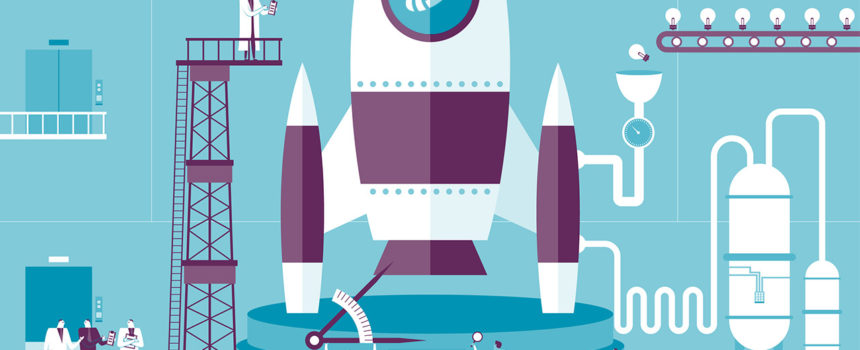Building anything well takes time, perseverance, detailed planning and trials. It doesn’t happen overnight. As I discovered when I was researching the incredible Apollo program for my recent ebook Accomplishing the Impossible: Lessons from the Apollo Space Program, the Apollo program was built step-by-step, layer by layer.
As you’re building something, you’re experimenting—not with the final product, but with various factors of it. That’s what accomplishing the impossible takes. At Pipeliner these various experiments are created in what I call “sandboxes,” so that the final product isn’t affected at all.
The Apollo program had pilot projects for many different aspects of what would be the final mission; nobody was going to fire humans off into space without a very firm idea what would happen to them. They created human-carrying centrifuges for monitoring the effects of multiple g-forces on astronauts, as would happen, for example, during takeoff. They created zero-gravity situations so that astronauts could experience it themselves. They created flight simulators so the astronauts could learn to fly the Apollo capsule and, later, the Lunar Module.
In the Apollo program, in addition to the pilot projects, they also learned from each and every mission—all the way up to the final one, Apollo 17.
Relating to Business
This piece-by-piece, trial and error process happens in business all the time but often without the same thoroughness of oversight. Only the real entrepreneurs, using their own money, are cautious about stepping out and trying things before first trying them on a smaller scale. They know they’re risking everything and want to be sure.
But often when people are working with money that isn’t theirs, they can be careless, profligate, even reckless with it. Perhaps they have received an injection of capital from investors, and take it as a license to spend wildly; after all it isn’t their money – they didn’t work to accumulate it. It doesn’t hold the same value for them, and as such their decision-making can become less rigorous and money gets wasted (This is, unfortunately, my critique of what happens too often in today’s VC climate).
Today a culture of just getting something to market without really proving the product or its ultimate utility – not too mention business or economic value – is becoming pervasive. Forget pilot projects, just launch the darned rocket. Imagine if the Apollo team had that attitude!
Ready for Anything
Of course, everyone who was alive at the time—or anyone who saw Ron Howard’s incredible 1995 film of the events—remembers Apollo 13, and the heroism from all quarters that averted certain disaster. The Apollo 13 mission demonstrated that even with everything very carefully planned out, and based soundly on previous successes, the unexpected can certainly strike.
In my opinion, good leadership and management always must bear that in mind. Something can always happen that is absolutely not predicted—in any field of endeavor including business.
Quoting Fredmund Malik, world-renowned management consultant and author, “A typical characteristic of a truly good manager is that he constantly operates on the premise that there will be unintended side effects, including some he can vaguely anticipate, and some he cannot even begin to imagine.” (Corporate Policy and Governance).
It Takes Patience…and More
At Pipeliner, we have certainly operated in this fashion from the beginning. We are in it for the long game, and each release of Pipeliner CRM is built securely on every past successful release. It is all built layer upon layer, and each layer must be solid.
Of course, when you are proceeding along over a period of years, you have the big picture in mind, and you know where you want to go—you can certainly become anxious for results. In the 8 years that the Apollo program was building up to the first moon landing, I’m sure there were many who impatiently posed the question, “Why aren’t we already on the moon?” Accomplishing such a goal requires extreme patience, endurance, continuity, and clear focus. You have many things to accomplish in a daily basis—but you always have the end in mind, and know where you’re headed.
That kind of patience isn’t often seen today. Too many companies want to take the shortest cut possible. They want that instant fast food solution: “I’m hungry, I go in, I eat.”
For truly building something valuable in life, there is no “fast food” type solution. That’s true for bringing up a child, that’s true for building a family, and that’s true for building a company. A 1,000% growth rate is just not an everyday occurrence—far from it. If companies could easily have that kind of growth, then every company would be a Google. Since there is only one of those, you can see that such growth, for most companies, is an unrealistic expectation.
There are companies that attempt to achieve incredible growth rates through mergers and acquisitions—they buy other companies and are thereby buying growth. But as we can see by many of the mega-companies that have “grown” this way, that isn’t real growth at all. Many of these are simply giant bureaucracies that can barely function, let alone grow and innovate.
In summary, the difficulty for a major undertaking, something you are building with care, is to stay focused on the process, not get lost, and to not allow yourself or your company to become sloppy. This is how accomplishing the impossible is done. With Apollo, each little piece was incredibly important, and the Apollo teams always viewed it that way.
If you do the same, you’ll build a solid enterprise.



















